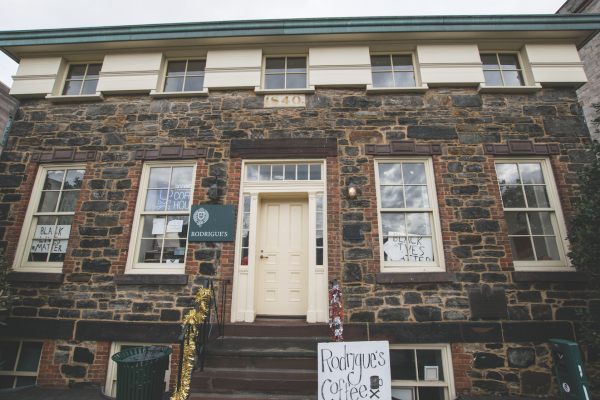What Counts as Free Speech?
The Dec. 7 incident at Rodrigue’s Coffee House has reignited the free speech debate at Fordham. (ANDREW BEECHER/THE OBSERVER)
January 25, 2018
Free speech is a term that seems to appear in every other news article in recent cycles. In everything from the white supremacist rallies in Charlottesville to students protesting on campus, free speech is at the forefront of many events that surround us. Last year, Fordham was ranked amongst the worst colleges in terms of free speech, and a recent event at Rodrigue’s Coffee House—or Rod’s—at Rose Hill has once again brought the debate of free speech to our university. The incident involved several members of Rose Hill’s College Republicans club entering the coffee house wearing “Make America Great Again” (MAGA) apparel in what they have called a “free speech exercise.” These individuals were forced to leave the coffee house after a confrontation by members on both sides.
Instead of giving my opinion on who was right or wrong in this incident, it would be more prudent to look at the current standoff between liberals and conservatives under the notion of free speech. The First Amendment prohibits the government from passing laws to suppress the right of individuals to speak or assemble to protest any grievances they may have with the government. The law doesn’t allow for any distinction based on the message of any individual or group, but we as a society have begun to decide what we want to hear and, consequently, what messages can be delivered. If we alter the Rod’s incident to only the MAGA hats for “I’m With Her” t-shirts and having the same confrontation, then the dialogue would be completely different. Instead of students saying, “How dare they wear MAGA hats,” the message would be that the members of Rod’s were anti-feminists and ultra-conservatives with a huge amount of support for the brave students showing their support of Hillary Clinton. It’s no secret that the majority of students at Fordham despise Trump and his administration—myself included—and thus, there will always be a negative reaction to MAGA gear because of what it represents. We can’t deny that we would have easily praised the actions of these individuals if they were wearing shirts with “Students for Justice in Palestine” or other liberal monikers on them.
Free speech was not designed to be one sided. In some cases free speech is abused and used to spread a hateful rhetoric, but censoring such a rhetoric would be illegal and unethical. While many view this as morally wrong, allowing hateful rhetoric under the First Amendment, we must take into account what censorship may entail. With a Trump administration that has chosen to shun the media and enact its own form of censorship, we cannot further put a strain on free speech. While the messages of others may be annoying or offensive to someone, that same person’s message may have a similar effect on others. Many students were upset when it was announced that Roger Stone was invited to speak at Rose Hill, mostly because of his history or racist and other forms of bigoted remarks. In the end, the event of him speaking to an auditorium full of students, many of whom loathed him, speaks volumes. Instead of protesting a person like Stone speaking, some students used the opportunity to call him out for his past remarks and this created a dialogue.
Our student body quickly shuns opinions and dialogue that they disagree with, which causes a rift between the liberal and conservative students. There have been numerous articles in The Observer that have addressed the need to increase the dialogue to include various ideologies but it seems that we are moving further away from this goal.
The Rod’s issue shows us that we, as a community, need to become less closed-minded. Whether we agree with something or not, we cannot simply ignore the ramifications of our actions and push the blame on the other party. We cannot ostracize the members of our communities who supported Trump. Instead, we should try to bridge the gap. The dialogue that we protect under free speech cannot remain one-sided if we are to encourage better discourse in our community.
(Featured image: ANDREW BEECHER/THE OBSERVER)













